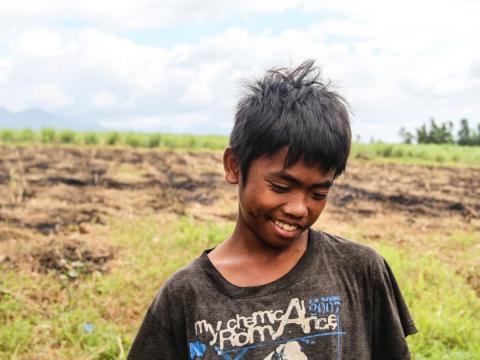How to pull a child labourer away from hazardous agricultural work

By Rhonda Hirst, World Vision Haiyan Response Communication Manager
No parent dreams of their child working at a young age, missing out on school. But for Mark and his family of seven children, one income wasn’t enough to provide for their basic needs.
Starting from age 7, Mark's son Paul carried the burden of work to give his other siblings a better chance in life.
“I wish things could be different. But if I work alone, I bring 600 pesos (about USD 13.50) a week to my family. Rice alone costs 700 pesos a week,” Mark says, his head hung low.
2013’s Typhoon Haiyan only made things worse for this struggling family. They lost their humble home and the little that they owned.
After an assessment of their community, Mark and his family were deemed one of the neediest families and World Vision provided them with two piglets, food and hog training.
Starting from age 7, Paul carried the burden of work to give his other siblings a better chance in life.
It was these piglets that led to the teenager being able to cease work for the first time in 7 years.
“Every time I would work it was hard for my body. But how can I stop when we hardly have enough rice even with two of us working? I just think maybe it will mean my brothers and sisters might go to school, even though that didn’t happen for me."
“But now we have the piglets, I am their carer. The money we make from the sale of them will mean we can then breed more piglets and keep selling them so we have enough money."
“I prefer looking after the piglets. I have time to be with my neighbours and my siblings for the first time – I am not so tired - and my body doesn’t hurt like before. I am very happy to have stopped working in fields,” Paul explains, with a slight smile.
Mark saw the delivery of the piglets as the first window of opportunity he has had for Paul to stop working.
“I feel relief that he is no longer in the fields with me. It is hard work for a man, let alone a young boy."
“We still need more, but this is a start. I do want all my children to go to school, and have opportunities,” he says.
For many poor families, child labour is inevitable. The International Labour Organization has stated there are nearly 3 million children in the Philippines who are working in places that are hazardous to their health and development instead of going to school.
Parents are not comfortable with it, and it certainly is not their preferred option. In less than ideal circumstances, it is comforting that livelihood assistance has already enabled this family a hand up – the cessation of Paul’s field work is a huge step in the right direction.